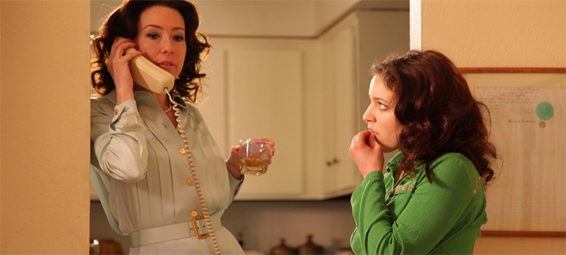The setting of Julia Dyer’s The Playroom smacks of a nostalgia for a decidedly more adult era, before parents’ lives were excessively oriented towards their kids, when coffee tables were adorned with ash trays filled with heaps of cigarette butts and parents maintained a division between the pleasures of adulthood and domain of children.
Olivia Harris plays Maggie Cantwell, the oldest child of Martin (John Hawkes) and Donna (Molly Parker). She is a teenage girl at that critical moment in adolescence when her life straddles innocence and experience. In the garage after school while her parents are still off at work, she strips for her boyfriend as they attempt awkward sex. Later on, she’s in the attic, playing Peter Pan’s Molly to her lost boy siblings, Janie (Alexandra Doke) and Christian (Jonathon McClendon), while her parents booze and cackle, flirting their way through yet another evening with their neighbors and friends, the Knotts.
It is with this domestic duality – the separated worlds of child and parent — that Dyer, with a script by her late sister Gretchen, uses to try to provoke a cathartic sense of mourning for youth lost to the snide self-interests of the mature set. Donna is a train wreck of a mother, who pours her first stiff drink in the middle of the afternoon and gazes dazedly out the kitchen window, so lost she has seemingly forgot what found felt like. Martin does better to maintain the veneer of paternal stability, but his forced chipper-ness belies an acknowledgement that their attempts at meshing the Beavers and the Bradys have all gone horribly wrong. The Knotts are just another drink, really, their shared card games and jokes provide giddy entertainment until, as the night wears on, a meanness settles in. All the while, the children are in the attic trying to loose themselves in fantasy. It’s survival of the innocents, but Olivia has become too aware of the implications of what’s going on downstairs to fully withdraw. A mid-evening row with her mother paired with her witnessing of infidelity and Olivia can surmise she is being forced to grow up. This night may be last time she’ll be able to escape to Never NeverLand.
What is successful about The Playroom’s comes through its meticulously realized setting. From the yellowish hue of the screen, to the furniture, record player, and Donna’s dress, the period setting places the film in the realm of a faded photograph, and we can intuit the fallout from this palpable temporality. But the action and characters within that setting don’t achieve the same deft dimensionality. Hawkes feels a little lost here and grasping for nuance in a character that provides little, and Donna’s spiraling wretch, while outshining her renowned co-star, pushes the theatrics past the point of melodrama. As a result, the film’s bitterness to become cartoonish instead of poignant. The revelation, however, is Olivia Harris, a young actress who straddles a range of emotions and lends the film its deepest-feeling, melancholic resonance.





